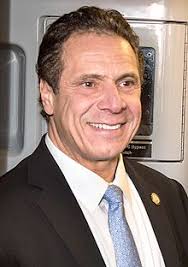ACE or Joker? Trump’s Self-Defeating Climate Rule
The ACE rule adds costs, achieves little, and disempowers the states. Nice job.
The Trump ACE rule violates all the Administration’s own deregulatory principles.To hear Trump talk, the point of deregulation is to reduce the burden of regulation on industry. But weirdly enough, that doesn’t turn out to be true of Trump’s effort to repeal Obama’s Clean Power Plan (CPP) and replace it with his own Affordable Clean Energy (ACE) rule. Both rules regulate carbon emissions from power plants (though Trump’s rule covers only coal plants). Accor...
CONTINUE READINGNew York’s Big Move
The Empire State has jumped into the first tier of state climate action.
Last week, New York Governor Andrew Cuomo signed a breakthrough climate change law, the "New York State Climate Leadership and Community Protection Act." What every state does to address climate change is worthwhile, of course, but New York is particularly significant in terms of the national picture. It’s the nation’s third-most populous state and also third economically, with a GDP about the same size as South Korea’s. It’s also one of the top ten carbon emitte...
CONTINUE READINGGuest Blogger Divya Rao: Sen. Udall and Rep. Lowenthal Champion New Legislative Effort to Curb Plastic Waste Pollution
Comprehensive federal legislation on single-use plastics, from bags to straws, anticipated to drop in Fall 2019
This past January, I was one of two students who had the opportunity to travel to Washington D.C. with the Surfrider Foundation and UCLA’s Frank G. Wells Environmental Law Clinic to brief Congress on harms caused by marine plastic pollution and steps the federal government can take to combat the problem by reducing waste from single-use plastics. Today, Congress took a first step towards comprehensive federal action in the United States on the single-use plastic cri...
CONTINUE READINGEndangered Deference
The Supreme Court’s recent, misguided, Weyerhaeuser decision displays the Court majority's hostility to agency expertise
Cross-posted from The Regulatory Review In Weyerhaeuser v. US Fish and Wildlife Service, a unanimous Supreme Court, with Justice Gorsuch not participating, indicated that it is not inclined to defer to agency expertise. Judicial power dominates this Court’s approach to administrative law, not just in the context of Chevron deference, and not just within the conservative wing. The Weyerhaeuser decision is likely to complicate future implementation of at least the...
CONTINUE READINGJustice John Paul Stevens, 1920-2019, Was An Environmental Hero
He was frequently the environmental voice of the Court
Justice John Paul Stevens was a giant figure in the history of the United States Supreme Court. He should also be remembered as the Court's greatest modern environmental voice. He authored the opinion in two of the most significant environmental cases of the last twenty years and the dissent in a third. Three times in the last 18 years, Professors Jim Salzman and J.B. Ruhl have surveyed environmental law professors and lawyers about the most significant environmen...
CONTINUE READINGHow I Learned to Stop Worrying and Love OIRA
OIRA may have had its problems. What we have right now is much worse.
If you’re like most environmentalists, you probably don’t have a high opinion of OIRA, the White House office that’s supposed to oversee regulations. (For those who are new to this, OIRA stands for the Office of Information and Regulatory Affairs.) The complaints are legion: that OIRA lacks transparency, that it acts as a back door for industry influence, that its role has never been authorized by Congress, and that its use of cost-benefit analysis tends to disfavo...
CONTINUE READINGThe Trump Administration’s Latest Efforts to Hobble the Clean Water Act
Administration's New Plan to Eviscerate States' CWA § 401 Certification Authority Is Flawed Procedurally & Substantively
By now, readers of Legal Planet are well aware of President Trump's ongoing efforts to rescind the Obama Administration's "Waters of the United States" rule and replace it with a new federal regulation that dramatically circumscribes federal regulatory authority under the Clean Water Act. My Legal Planet colleagues and I have previously blogged on this topic, and I won't retread that ground here. But the Trump Administration's efforts to eviscerate the federal Clean...
CONTINUE READINGResolving Interconnection Disputes to Speed Clean Technology Deployment
New California agency dispute resolution process in need of expert panelists
When a homeowner or business wants to install clean technology like renewable electricity generation or energy storage either for on-site usage or as a grid service, they occasionally run into problems obtaining approvals from the local electric utility to connect that resource to the electrical grid. The owner must enter into an interconnection agreement with the utility to set the terms of the grid connection and help the utility to track installations system-wide, but...
CONTINUE READINGWhere’s the Beef?
Mississippi's "Veggie Burgers" Ban is Almost Certainly Unconstitutional
Mississippi recently passed a law that has the effect of banning terms like “veggie burger.” It's easy to imagine other states passing similar laws. From an environmental view, that’s problematic, because beef in particular is connected with much higher greenhouse gas emissions than plant products. It’s not just the methane from cow-burps, it’s also all the carbon emissions connected with growing corn to feed the cattle. But in addition to its environment...
CONTINUE READINGJustice Stevens and the Rule of (Environmental) Law
A simple but powerful principle: courts and agencies should respect statutes.
Justice Stevens and the Rule of (Environmental) Law There’s already been a lot written in the aftermath of Justice Stevens’s death, including Ann Carlson’s excellent Legal Planet post last week. I’d like to add something about an aspect of his jurisprudence that had great relevance to environmental law: his belief in the rule of law, and specifically, in the duty of both the judiciary and the executive branch to respect and implement congressional mandates. ...
CONTINUE READING








